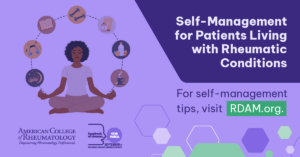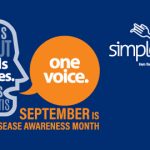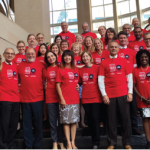 Self-Management Is an Important Puzzle Piece for Patients Living with Rheumatic Disease
Self-Management Is an Important Puzzle Piece for Patients Living with Rheumatic Disease
Rheumatology professionals know that self-management can help patients with rheumatic conditions, but self-management is not as prevalent as it could or should be. This year’s Rheumatic Disease Awareness Month (RDAM), in September, will focus on patient self-management to boost aware¬ness of this important aspect of care.
This year’s theme—self-management for patients living with rheumatic conditions—“is crucial [because] it helps bridge the existing information gap on self-management,” says Bhakti Shah, MD, a rheumatologist with Crystal Run Healthcare, Middletown, N.Y., and a physician spokesperson for this year’s RDAM campaign. Dr. Shah is also a member of ACR’s Communications and Marketing Committee (CMC), which provides medical expertise on various marketing campaigns and resources.
“The campaign seeks to equip our patients with the tools and confidence to play a more engaged role in managing their rheumatic condition, ultimately enhancing their overall treatment experience,” Dr. Shah says.
‘[Self-management] involves patients proactively understanding & learning lifestyle changes & strategies to improve their well-being.’ —Dr. Shah
Dr. Shah believes it’s important to distinguish self-management from self-care because they are not the same. “Self-management is an individual’s day-to-day management of their chronic conditions over the course of an illness. Self-care consists of those tasks performed by healthy people to prevent illness rather than manage an existing illness,” she says.
Within rheumatology, self-management includes working with a healthcare team to develop a comprehensive approach beyond just medication adherence, Dr. Shah notes.
“It involves patients proactively understanding and learning lifestyle changes and strategies to improve their well-being,” she says.
In her own practice, Dr. Shah has observed patients seeking support by joining various groups on social media and having a strong desire to improve their symptoms solely through medical therapies. “I’d like to encourage patients to take a step back and look at their health on a grander scale,” she says.
“Our focus for RDAM this year is on empowering patients living with rheumatic conditions to take charge of their health by incorporating self-management strategies and promoting active collaboration with their rheumatology care teams,” says Mohammad A. Ursani, MD, a community practice rheumatologist in The Woodlands, Texas, and chair of the CMC. “The goal is to equip our patients with the tools and confidence to play a more active role in managing their condition and treatment.”
 Using the RDAM Resources
Using the RDAM Resources
As part of the RDAM campaign, the ACR has created a toolkit that includes a whiteboard video, a patient testimonial video, an infographic with five self-management tips and social media graphics. These resources are available online at RDAM.org.
Rheumatology professionals can use the resources created for RDAM to educate patients about self-management and, ideally, improve outcomes. The resources also are a way to partner with patients to make complex rheumatology information accessible and actionable.
“Each patient encounter is an opportunity for rheumatologists to remind patients to incorporate self-management techniques into their lives,” Dr. Shah says. “During my patient visits, I try to review topics, such as medication adherence, physical activity and quality of life. I remind my patients that we are a team and that collaboration will lead to improved outcomes for them.”
Examples of self-management tips include getting regular physical activity and managing stress. See more in the sidebar below.
RDAM Through the Years
The ACR’s Simple Tasks Public Awareness Initiative launched RDAM in September 2016, with a focus on increasing the understanding and awareness of rheumatic symptoms and challenges. Past themes have included reproductive health, biosimilars and issues that affect patients living with rheumatic conditions.
Celebrity public service announcements for RDAM have been recorded by Terry Bradshaw, Jennie Garth and Venus Williams. Components of some previous RDAMs have included a national survey, a report card and a patient-focused webinar.
Vanessa Caceres is a medical writer in Bradenton, Fla.
Self-Management Tips for Patients with Rheumatic Conditions
Manage your stress: Your rheumatic condition can have both physical and mental effects on your health. To help practice mindfulness, work to create your own relaxation practices, such as meditation, self-reflection, journaling and other exercises, including deep breathing, yoga or tai chi.
Take your medication: Work with your clinician to understand your medications, what aspects of your disease they treat and why it’s important to continue those medications.
Make lifestyle changes, such as exercising regularly and eating well: Dedicate 30–45 minutes every day to weight training and recreational or leisure activities, such as jogging, walking, golfing and swimming. Consuming a healthy diet of whole foods and grains is important for general well-being. This tip is particularly true if you’re on medications, such as steroids, that can cause weight gain.
Communicate and collaborate with your healthcare team:Maintain open communication with your rheumatology healthcare team, including your rheumatologist, physical therapist and other specialists.
Maintain a support group: Ask your family or friends for help when needed. If some tasks are particularly hard during disease flares or you need help managing your appointments, don’t hesitate to ask those close to you for help.



